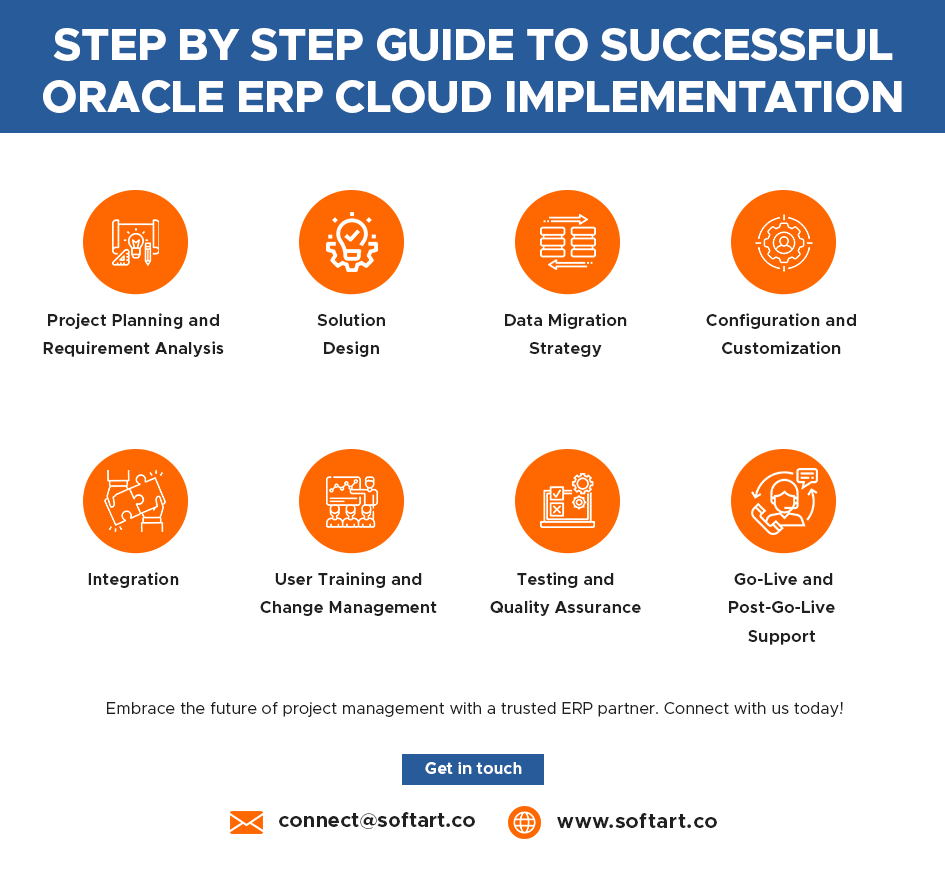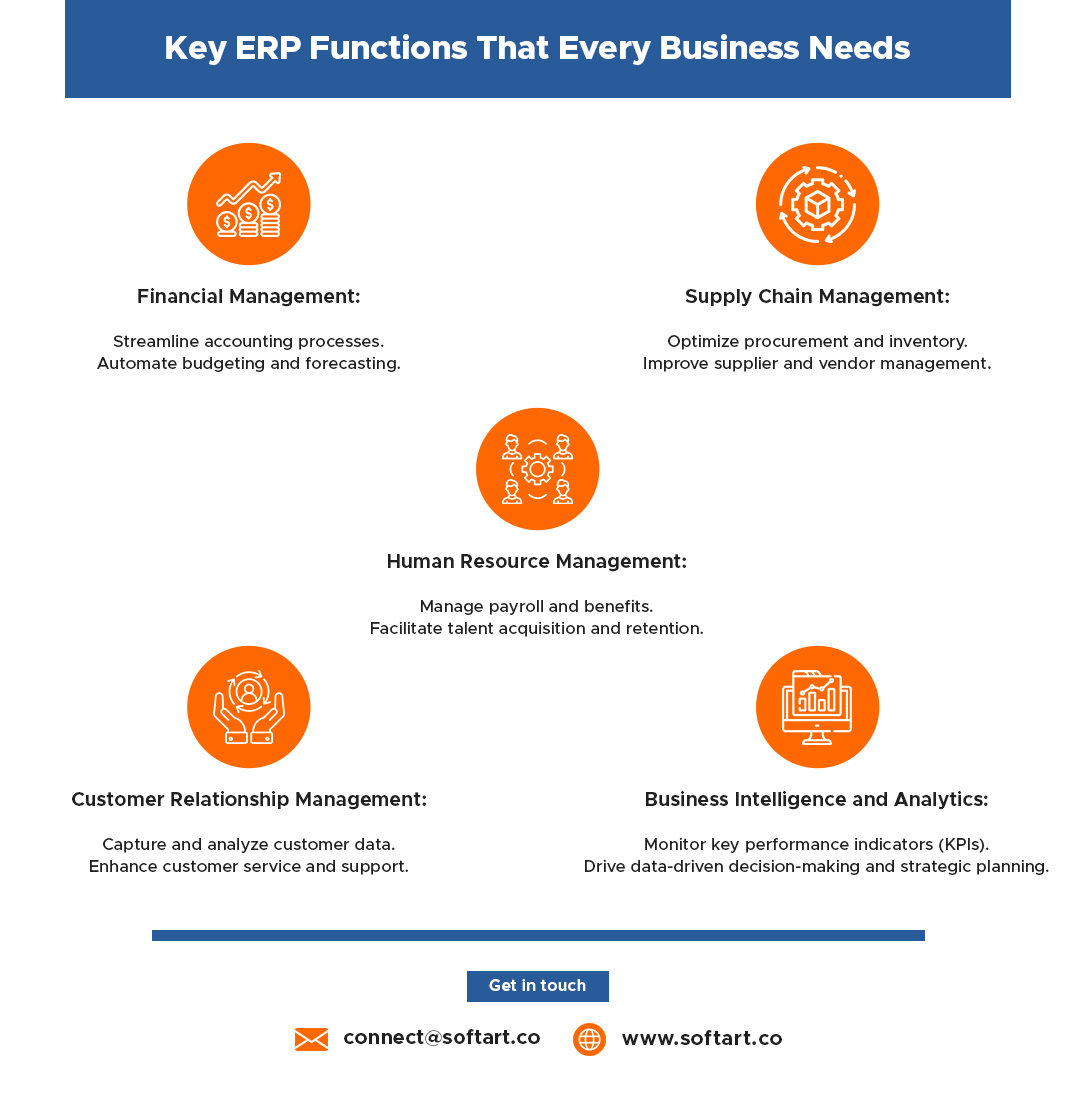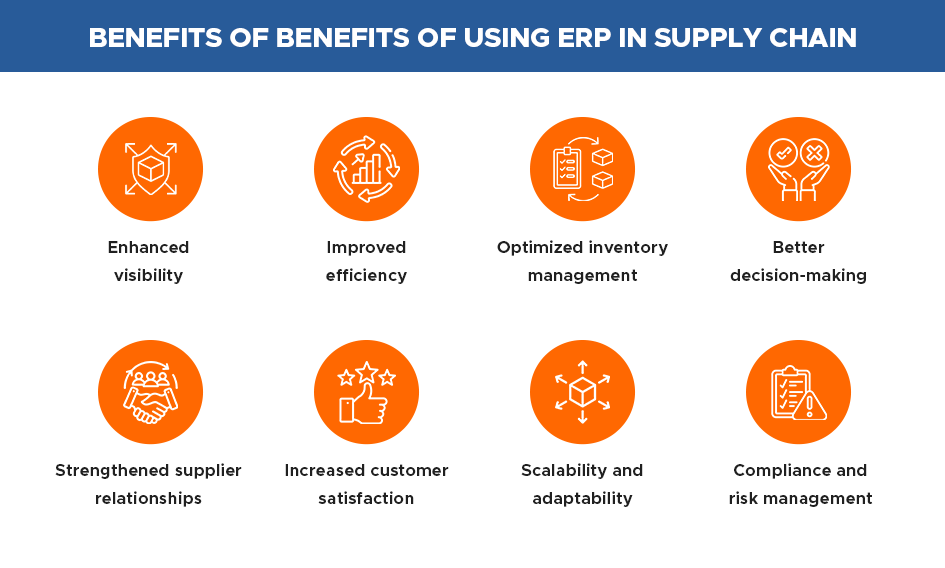
ERP plays a pivotal role in a company’s resource planning by consolidating all necessary processes into a single system. According to a 2024 techreport, currently, 24% of companies utilize ERP software to manage their sales operations.
Among the numerous ERP solutions available, Oracle Cloud ERP stands out due to its comprehensive suite of applications designed to streamline business processes. However, successful Oracle ERP Cloud implementation requires a meticulous testing strategy.
This blog will guide you through the testing strategy for Oracle Cloud ERP implementation, ensuring your integration process is seamless and effective.
When considering an ERP solution, Oracle ERP Cloud integration emerges as a formidable choice. Oracle ERP Cloud offers a robust, scalable, and flexible solution that caters to the diverse needs of modern enterprises. But why exactly should you choose Oracle ERP Cloud integration?
Firstly, Oracle ERP Cloud provides a comprehensive suite of applications that integrate various business processes such as financials, procurement, project management, and more. This integration facilitates real-time data flow across departments, enhancing decision-making and operational efficiency.
Secondly, Oracle ERP Cloud is designed with scalability in mind. As your business grows, Oracle’s cloud-based solution can easily scale to accommodate increased data and user loads without compromising performance. This ensures that your ERP system remains aligned with your business needs over time.
Moreover, Oracle Fusion Cloud ERP, a part of the Oracle ERP Cloud suite, offers advanced features like AI-driven analytics, automated workflows, and intuitive user interfaces. These features not only enhance user experience but also drive innovation by leveraging emerging technologies.
Lastly, Oracle Cloud ERP support is another compelling reason to opt for this solution. Oracle provides extensive support services, including regular updates, security patches, and 24/7 customer assistance. This support framework ensures that your ERP system remains secure, up-to-date, and aligned with industry best practices.
Now, the implementation isn’t easy unless done with the right experts. Let’s discuss this further
Implementing Oracle Cloud ERP can be transformative, but it comes with its own set of challenges. Here are some common hurdles you might encounter:
Complexity of Integration: Integrating Oracle Cloud ERP with existing systems can be complex and time-consuming.
Data Migration: Ensuring accurate and seamless data migration from legacy systems to the new ERP can be challenging.
Customization Requirements: Customizing the ERP to meet specific business needs often requires extensive configuration and development.
User Training and Adoption: Ensuring that all users are adequately trained and comfortable with the new system can be a significant hurdle.
Cost and Time Overruns: Implementations can often exceed initial budget estimates and timelines.
Change Management: Managing organizational change and ensuring all stakeholders are on board with the new system is critical.
Testing and Quality Assurance: Comprehensive testing is crucial to identify and rectify issues before the system goes live.
To ensure a successful Oracle ERP Cloud implementation, it’s crucial to follow a structured approach. Here’s a step-by-step guide to help you navigate the process:
Begin with thorough project planning. Define your project scope, goals, timeline, and budget. Conduct a detailed requirement analysis to understand the specific needs of your business and how Oracle ERP Cloud can address them. Engage stakeholders from various departments to gather comprehensive requirements.
Based on the gathered requirements, design your ERP solution. This involves mapping business processes to the functionalities offered by Oracle ERP Cloud. Identify any gaps and determine how to address them through customization or additional modules.
Develop a data migration strategy to transfer data from legacy systems to Oracle ERP Cloud. Ensure data accuracy and completeness. Plan for data cleansing and validation processes to maintain data integrity during the migration.
Configure the Oracle ERP Cloud applications to align with your business processes. Customize the system as needed to meet specific requirements. Ensure that customizations are documented and tested thoroughly.
Integrate Oracle ERP Cloud with other existing systems within your organization. This may involve integrating with CRM systems, third-party applications, or other internal databases. Ensure seamless data flow and interoperability between systems.
Implement a comprehensive training program for all users. Provide hands-on training sessions, workshops, and detailed user manuals. Address any resistance to change by communicating the benefits of the new system and involving key stakeholders in the transition process.
Conduct rigorous testing at various stages of the implementation. This includes unit testing, integration testing, system testing, and user acceptance testing. Identify and rectify any issues to ensure the system functions as expected.
Execute the cutover plan and go live with Oracle ERP Cloud. Monitor the system closely during the initial days of operation to address any issues promptly. Provide post-go-live support to assist users and ensure a smooth transition.
Even after a successful go-live, the work doesn’t stop. Continuously monitor the system’s performance and gather feedback from users. Identify areas for improvement and implement necessary changes. Stay updated with Oracle Cloud ERP support to leverage new features and updates.

Implementing Oracle ERP Cloud is a complex but rewarding journey that can transform your business
operations. To ensure success, it’s essential to have a reliable partner by your side. SoftArt offers comprehensive Oracle Cloud ERP support, from initial planning and integration to post-go-live assistance. With our expertise and commitment to excellence, we help you navigate the challenges and maximize the benefits of Oracle Fusion Cloud ERP.
Contact SoftArt today to learn how we can support your Oracle ERP Cloud integration and help your business achieve its digital transformation goals. Let us be your trusted partner in this journey towards operational excellence and innovation.
When you’re dealing with modern commerce, success hinges on more than just great products or services. In business, it’s about orchestration—seamlessly aligning every area of your organization to operate seamlessly, maximizing efficiency and driving growth.
And Enterprise Resource Planning (ERP) has the potential to transform businesses into well-oiled machines.
From the bustling floors of manufacturing plants to the intricate web of global supply chains, ERP solutions like Oracle Fusion Cloud ERP and specialized manufacturing and distribution software are the backbone of operations. They have revolutionized how businesses operate by integrating various functions into a unified platform.
Let’s discuss the core functions of ERP systems further to understand how they drive organizational success.
But before we talk about the functionalities, let’s brush up on some benefits that you may not know of.
The list of benefits is long and effects on business are massive. Here are some of the key benefits that ERP brings with it
ERP integrates and automates processes, reducing manual tasks and improving workflow efficiency.
The right software provides real-time access to data, fostering collaboration, informed decision-making, and regulatory compliance.
By automating tasks and providing insights, ERP boosts productivity and reduces operational costs.
ERP optimizes resource allocation, reducing waste and maximizing profitability.
ERP systems easily adapt to business growth, accommodating changes in volume, users, and operations seamlessly.
It’s time to talk about intricate workings of ERP systems. From financial management to supply chain optimization, there are multiple ERP functionalities that form the backbone of modern businesses.
At the heart of any ERP system lies robust financial management capabilities. These encompass functionalities like accounts payable, accounts receivable, general ledger, and financial reporting. Oracle Fusion Cloud ERP, for instance, streamlines financial processes, ensuring accuracy, compliance, and real-time insights into financial performance. From budgeting to cash flow management, ERP systems provide a comprehensive suite of tools to optimize financial operations.
Efficient supply chain management is critical for businesses to meet customer demands while controlling costs. ERP solutions offer features for procurement, inventory management, demand forecasting, and logistics coordination. With ERP manufacturing software, manufacturers can streamline production processes, manage raw material inventory, and enhance collaboration with suppliers. Distribution ERP software, on the other hand, enables seamless order fulfillment, inventory tracking, and delivery management, ensuring timely delivery to customers.
Managing human capital effectively is paramount for organizational success. ERP systems encompass modules for HR management, including payroll processing, employee data management, performance evaluation, and training administration. These functionalities streamline HR processes, enhance workforce productivity, and facilitate strategic decision-making. With Oracle Fusion Cloud ERP, organizations can optimize HR operations, from recruitment to retirement, fostering employee engagement and retention.
In today’s competitive landscape, nurturing customer relationships is crucial for business growth. ERP systems integrate customer relationship management (CRM) functionalities to manage interactions with customers across various touchpoints. From lead generation to post-sales support, CRM modules enable businesses to track customer interactions, analyze customer data, and personalize marketing efforts. By leveraging ERP solutions, organizations can enhance customer satisfaction, drive loyalty, and maximize lifetime value.
Data-driven decision-making is the cornerstone of modern business strategy. ERP systems offer robust business intelligence and analytics capabilities to transform data into actionable insights. With built-in analytics tools and customizable dashboards, organizations can monitor key performance indicators, identify trends, and forecast future outcomes. Oracle Fusion Cloud ERP empowers businesses with real-time analytics, enabling agile decision-making and continuous performance improvement.
However, ERP systems are not one-size-fits-all solutions; instead, they come in various types, each tailored to meet specific industry requirements and organizational needs.

The diversity in ERP systems enables businesses to choose the most suitable option based on factors like industry vertical, company size, and functional requirements.
Industry-Specific ERP
Tailored for particular industries such as manufacturing, retail, healthcare, or construction, these ERP systems are customized to address industry-specific challenges and requirements. They often come with pre-configured modules and functionalities designed to streamline processes unique to that industry.
Cloud-Based ERP
Cloud-based ERP systems, such as Oracle Fusion Cloud ERP, are hosted on remote servers and accessed via the internet. They offer scalability, flexibility, and cost-effectiveness, making them an attractive option for businesses looking to minimize infrastructure costs and enhance accessibility.
On-Premises ERP
These systems are installed and maintained locally on a company’s own servers and hardware. While they offer greater control and customization options, they require significant upfront investment and ongoing maintenance.
Open-Source ERP
Open-source ERP systems provide source code access, allowing businesses to customize and modify the software according to their specific requirements. They offer flexibility and cost savings but may require technical expertise for implementation and support.
Small Business ERP
Designed for small and medium-sized enterprises (SMEs), these ERP systems offer scaled-down versions of enterprise-grade functionalities tailored to the needs and budget constraints of smaller businesses. They often focus on core functions like accounting, CRM, and inventory management, with simplified interfaces and pricing models.
Now, the question arises how to know whether you’re choosing the right ERP for your business? Well, here is what you can do.
Equipping your business with the power of ERP systems is indispensable for driving growth and achieving operational excellence.
SoftArt offers comprehensive ERP solutions tailored to your unique business needs, whether you require Oracle Fusion Cloud ERP, ERP manufacturing software, or distribution ERP software. With our expertise and dedication to client success, we empower organizations to unlock their full potential and thrive in a rapidly evolving market.
Contact us today and fuel your business with SoftArt by your side.
Supply Chain Management (SCM) plays a pivotal role in driving organizational success and maintaining competitive advantage. As businesses strive to meet the ever-changing demands of consumers while optimizing operational efficiency, the importance of robust Enterprise Resource Planning (ERP) systems in SCM has never been more pronounced.
However, the path to supply chain excellence is fraught with challenges, particularly in today’s dynamic environment characterized by rapid technological advancements, geopolitical uncertainties, and global pandemics. Supply chains are constantly susceptible to disruptions, ranging from natural disasters and geopolitical tensions to economic fluctuations and unforeseen market shifts.
Against this backdrop, Oracle Fusion Cloud ERP helps businesses seeking to overcome the challenges of supply chain disruption. With its advanced features, cloud-based architecture, and integrated suite of applications, Oracle ERP empowers organizations to navigate through turbulent waters with confidence and resilience. By harnessing the power of Oracle ERP, businesses can proactively identify risks, optimize operations, and maintain continuity amidst uncertainty, ultimately driving growth and ensuring long-term success in today’s dynamic business landscape.
Let’s discuss how the ERP can ease the supply chain disruptions
In the ever-evolving landscape of supply chain management, having real-time visibility into operations is akin to having a compass in a storm. Oracle Fusion Cloud ERP equips businesses with this critical capability, enabling them to monitor every facet of their supply chain with unparalleled precision.
By consolidating data from disparate sources, including suppliers, manufacturers, distributors, and customers, Oracle ERP provides a holistic view of the supply chain ecosystem. This real-time visibility allows organizations to identify bottlenecks, anticipate potential disruptions, and swiftly respond to changing market dynamics.
Moreover, Oracle ERP goes beyond mere observation by leveraging predictive analytics to forecast future trends and scenarios. By analyzing historical data, market trends, and external factors, Oracle ERP enables businesses to predict demand fluctuations, supply chain risks, and potential disruptions with remarkable accuracy. Armed with this foresight, organizations can formulate proactive strategies, optimize resource allocation, and minimize the impact of disruptions on their operations.
In the volatile realm of supply chain management, accurate demand forecasting is paramount for maintaining optimal inventory levels and meeting customer expectations. Oracle Fusion Cloud ERP empowers businesses with advanced demand planning and forecasting tools that leverage cutting-edge analytics and machine learning algorithms.
By analyzing historical sales data, market trends, and customer behavior patterns, Oracle ERP enables organizations to generate precise demand forecasts tailored to their specific needs. These forecasts serve as a foundation for strategic decision-making, enabling businesses to adjust production schedules, optimize inventory levels, and align procurement strategies with anticipated demand.
Furthermore, Oracle ERP facilitates agility in demand planning by enabling organizations to conduct scenario analysis and simulate various supply chain scenarios. This proactive approach equips businesses with the flexibility to adapt to changing market conditions, seize opportunities, and mitigate risks associated with supply chain disruptions.
The resilience of a supply chain is contingent upon the strength of its supplier relationships. Oracle Fusion Cloud ERP offers robust Supplier Relationship Management (SRM) capabilities, enabling businesses to cultivate collaborative partnerships, monitor supplier performance, and mitigate supply chain risks effectively.
Through Oracle ERP’s centralized supplier database, organizations can streamline supplier onboarding, manage contracts, and track performance metrics in real-time. Moreover, Oracle’s Supplier Portal facilitates seamless communication and collaboration between buyers and suppliers, fostering transparency, trust, and accountability across the supply chain.
In times of disruption, Oracle ERP enables organizations to leverage supplier data to identify alternative sources, assess supplier capabilities, and establish contingency plans. By diversifying their supplier base and building resilient partnerships, businesses can minimize supply chain disruptions, ensure continuity of operations, and maintain customer satisfaction.
Effective inventory management is essential for mitigating the impact of supply chain disruptions and ensuring operational efficiency. Oracle Fusion Cloud ERP offers advanced inventory optimization tools and warehouse management capabilities designed to enhance inventory visibility, streamline operations, and optimize resource utilization.
Through Oracle ERP’s inventory optimization module, businesses can analyze demand patterns, assess lead times, and determine optimal inventory levels across their supply chain network. By leveraging predictive analytics and optimization algorithms, organizations can minimize excess inventory, reduce carrying costs, and improve order fulfillment rates.
Furthermore, Oracle’s Warehouse Management module empowers businesses to optimize warehouse layout, streamline inbound and outbound processes, and enhance inventory accuracy through barcode scanning and RFID technology. By optimizing warehouse operations, businesses can improve order cycle times, reduce storage costs, and enhance customer satisfaction.
In today’s interconnected global economy, supply chain collaboration is essential for resilience and agility. Oracle Fusion Cloud ERP facilitates seamless collaboration and visibility across the entire supply chain ecosystem, enabling stakeholders to communicate, share data, and coordinate activities in real-time.
Through features such as collaborative planning, electronic data interchange (EDI), and supplier portals, Oracle ERP fosters transparency, agility, and trust among supply chain partners. By enabling real-time communication and data sharing, Oracle ERP enhances visibility into supplier activities, inventory levels, and production schedules, enabling stakeholders to anticipate potential disruptions and respond swiftly to changing market conditions.
Moreover, Oracle ERP’s supply chain collaboration capabilities extend beyond traditional boundaries, enabling businesses to collaborate with suppliers, manufacturers, distributors, and customers on a global scale. By fostering collaboration and innovation across the supply chain ecosystem, Oracle ERP enables organizations to build resilient, agile, and customer-centric supply chains that can withstand the challenges of today’s dynamic business environment.

In conclusion, Oracle Fusion Cloud ERP emerges as a game-changer for businesses seeking to navigate through supply chain disruptions with resilience and agility. By leveraging its advanced capabilities in real-time visibility, predictive analytics, demand planning, supplier relationship management, inventory optimization, and supply chain collaboration, organizations can proactively identify risks, mitigate impacts, and seize opportunities amidst uncertainty.
SoftArt offers Oracle ERP Cloud Solutions that stand at the forefront, empowering businesses to overcome challenges, drive growth, and thrive in an ever-changing world. By investing in Oracle Fusion Cloud ERP with the experts organizations can build resilient, agile, and customer-centric supply chains that are well-equipped to navigate the complexities of today’s global marketplace.